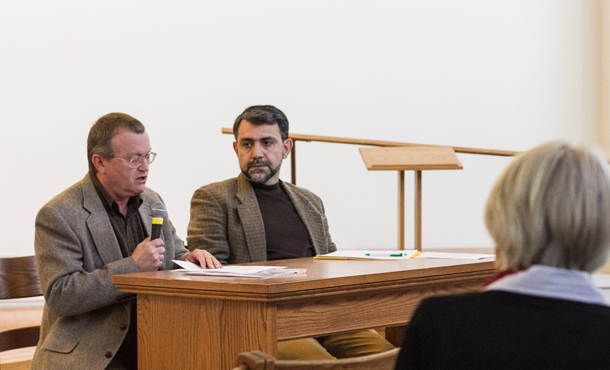When the Center for Interfaith Engagement (CIE) at Eastern Mennonite University brings people of different religions together to talk, what’s the point? Should everyone water down their beliefs in order to find as much agreement as possible? Or, at the opposite extreme, should they be trying to convert each other?
At a March 27, 2014, forum in Martin Chapel, two professors of religion at EMU debated approaches to interfaith engagement that lie somewhere in the middle. Amir Akrami, a visiting Muslim scholar from Iran, argued for “pluralism” as the best approach, while Mark Thiessen Nation, professor of theology at Eastern Mennonite Seminary, promoted what he calls “particularism.”
The forum was led by CIE director Ed Martin.
Every person adheres to a “particular” belief system and wants others to join him or her in those beliefs, said Nation. At the same time, that doesn’t mean exposure to other beliefs has no value, he added. “I can believe that someone of another faith is profoundly wrong but still learn from them,” he said.
Nation, who did not grow up Christian, expressed concern that many Christians in general – and Mennonites in particular – are too willing to allow specific, “textured” Christian beliefs to be displaced by more vague, pluralistic ways of thinking.
He was drawn to the Mennonite faith through theologian John Howard Yoder’s seminal work, The Politics of Jesus, and he is particularly concerned that Mennonites not water down their stance on peace. “Many young people especially don’t want any clear convictions and are gravitating towards pluralism,” he said.
Pluralism, though, is exactly what Akrami wants to see. Too many people think their religion is superior to all others and that they have nothing to learn from other faiths, he said. “We must hold our particular beliefs but acknowledge that others hold particular beliefs as well,” he added.
To Akrami, pluralism means people must accept that other religions contain truth. “Pluralism is not a new religion or an attempt to reduce our religions to the least common denominator,” he said. “Pluralism is not wishy-washy relativism.”
Akrami, who has been involved in many interfaith dialogues over the years, argued that religious interaction often leads to pluralism. “I have learned that I do not possess the whole truth,” he said. “I want to be enriched by the truth in other religions while at the same time we challenge each other.”
A visiting scholar at EMU from 2012 through August 2014, Akrami has taught several courses on Islam. This semester he is co-teaching a class on comparative monotheisms with a visiting Jewish scholar and a Mennonite professor.
In Iran, Akrami was a researcher and lecturer at the Iranian Institute of Philosophy. Before that he was a visiting research fellow at the Centre for Islamic Studies and Christian-Muslim Relations at the University of Birmingham in England. He earned a doctorate in the philosophy of religion at McGill University in Montreal, Canada.
Nation has taught at Eastern Mennonite Seminary for 11 years. Before joining the faculty, he was founding director of an ecumenical peace and justice organization, pastor in several denominations and director of London Mennonite Centre in England. His doctorate is in theological ethics from Fuller Theological Seminary in Pasadena, Calif.
CIE, founded in 2009 and funded by grants and private donations, promotes interaction between people of different faiths, especially the three world religions that worship one God and claim Abraham as one of their forebearers – Judaism, Christianity and Islam.

We are very lucky to have Seyed Amir at EMU. He is a top-notch thinker philosopher, and very personable. Thanks to CIE for bringing him.